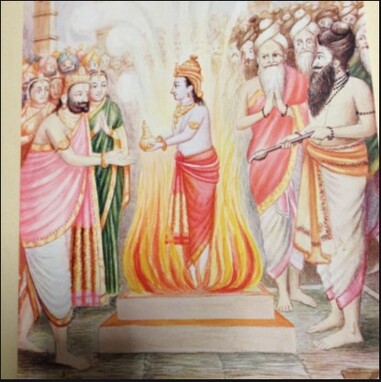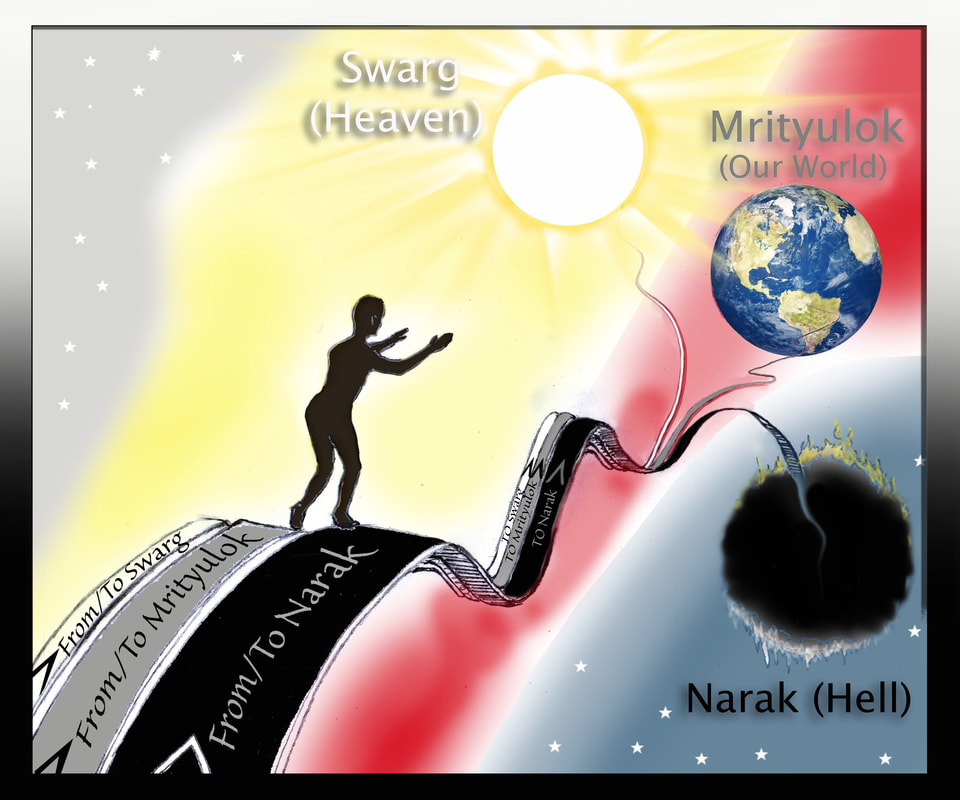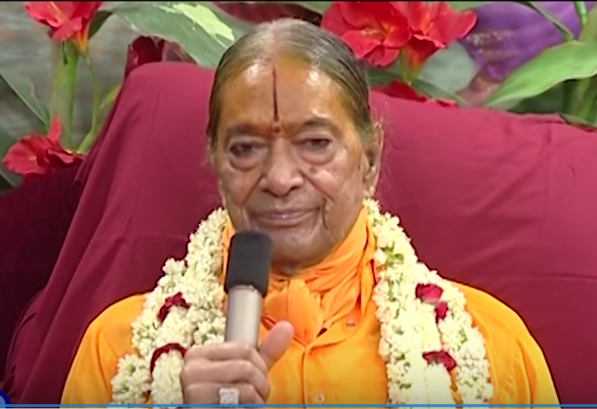 Does destiny limit what comes our way OR by working extra hard can we attain more?
Does destiny limit what comes our way OR by working extra hard can we attain more?
In His divine spiritual discourses, Shri Maharaj Ji often makes two statements that appear to be contradictory to each other:
So the question arises whether destiny limits what comes our way, or by working extra hard can we attain higher education, more money and everything else that we desire for?
- The "Human form of life is called Karma Yoni so we can achieve whatever we wish to attain". It is also our experience that defying severe odds in life, people have attained higher education. Our scriptures also talk about instances where many have attained significant material gratifications including attaining the throne of a king or being blessed with a son after performing severe austerities or yagya.
- In other discourses, Shri Maharaj Ji says,"don't work long hours, keep some time for spiritual growth. Working more doesn't get you more money as some laborers work 12-14 hours a day and find it difficult to make both ends meet, while there are others who hardly work for a few hours a day and make millions".
So the question arises whether destiny limits what comes our way, or by working extra hard can we attain higher education, more money and everything else that we desire for?
Answer:
Human beings are sentient. Human beings are also bestowed with a mind which is constantly engaged in the act of thinking, even while we are asleep. The only time the mind goes to sleep is when we are in a state of deep slumber (Sushupti). However, we act upon only a very few of the thoughts that go through our mind. As per spiritual law, God grants us the fruits of every action (thought) performed by our mind.
Human beings are sentient. Human beings are also bestowed with a mind which is constantly engaged in the act of thinking, even while we are asleep. The only time the mind goes to sleep is when we are in a state of deep slumber (Sushupti). However, we act upon only a very few of the thoughts that go through our mind. As per spiritual law, God grants us the fruits of every action (thought) performed by our mind.
|
पुण्येन पुण्यलोकं नयति पापेन पापमुभाभ्यामेव मनुष्यलोकम्॥ वेद
puṇyēna puṇyalōkaṁ nayati pāpēna pāpamubhābhyāmēva manuṣyalōkam॥ vēda शुभकृच्छुभमाप्नोति पापकृत्पापमुच्यते ॥ वेद śubhakr̥cchubhamāpnōti pāpakr̥tpāpamucyatē ॥ vēda “Performance of good deeds leads to the attainment of swarg - heaven or celestial abodes, where the individual soul enjoys material gratifications and sensual pleasures. Bad actions lead to narak - hellish abodes, where the soul is punished for their wrongful doings and made to suffer. Good and bad actions combined lead to being born on earth, the mortal world.”
It is very unfortunate that most of our actions fall in the category of bad actions (sins). In Gita, Lord Krishna explains good and bad actions as: मन्निमित्तं कृतं पापं मद्धर्माय च कल्पते ।
मामनादृत्य धर्मोऽपि पापं स्यान्मत्प्रभावतः । mannimittaṃ kṛtaṃ pāpaṃ maddharmāya ca kalpate । māmanādṛtya dharmo'pi pāpaṃ syānmatprabhāvataḥ |
“Any action, offered unto Me, is dharma (righteous deed), while any action (even though it may appear to be a sacred deed) performed without remembering Me, is adharma (unrighteous deed).”
The reason behind this is fairly simple: Other than us (Jeev) there are only two more eternal entities : They are Maya and God. If the mind is not engaged in the remembrance of the divine entity God, it would naturally be engaged in the matters of the world i.e. Maya, which means the mind will be full of the vices of Maya like anger, passion, greed and avarice. The message being that there are only two places for the mind to go - the area of God and the area of Maya.
God is supremely kind. He does not make us suffer the consequences of all of our bad actions right away. Most of the results of our actions are stored as sanchit karma (a reservoir of all actions), which we have to undergo gradually either later in the same life or in future lives. Since we have existed for uncountable lifetimes, we have performed uncountable actions, the results of which are also uncountable. Hence even in innumerable lifetimes, we cannot undergo the fruits of all those actions.
God takes a very small fraction of these sanchit karma and makes us undergo the consequences of those karma in one lifetime. These actions are called prarabdh karma. Also known as destiny or fate.
The reason behind this is fairly simple: Other than us (Jeev) there are only two more eternal entities : They are Maya and God. If the mind is not engaged in the remembrance of the divine entity God, it would naturally be engaged in the matters of the world i.e. Maya, which means the mind will be full of the vices of Maya like anger, passion, greed and avarice. The message being that there are only two places for the mind to go - the area of God and the area of Maya.
God is supremely kind. He does not make us suffer the consequences of all of our bad actions right away. Most of the results of our actions are stored as sanchit karma (a reservoir of all actions), which we have to undergo gradually either later in the same life or in future lives. Since we have existed for uncountable lifetimes, we have performed uncountable actions, the results of which are also uncountable. Hence even in innumerable lifetimes, we cannot undergo the fruits of all those actions.
God takes a very small fraction of these sanchit karma and makes us undergo the consequences of those karma in one lifetime. These actions are called prarabdh karma. Also known as destiny or fate.
आयुः कर्म च वित्तं च विद्या निधनमेव च। पंचैत्यान्यपि सृज्यन्ते गर्भस्थस्यैव देहिनः ॥
हितोपदेश
āyuḥ karma ca vittaṃ ca vidyā nidhanameva ca। paṃcaityānyapi sṛjyante garbhasthasyaiva dehinaḥ ॥
hitopadeśa
 One can acquire material gratifications by performing yagya, havan and other austerities. Yet if it is not in their destiny to enjoy those material gratifications, they tend to lose those very objects of sensory gratification.
One can acquire material gratifications by performing yagya, havan and other austerities. Yet if it is not in their destiny to enjoy those material gratifications, they tend to lose those very objects of sensory gratification.
“The five things that are predestined in life are age, profession, wealth, education and cause of death.”
Even though these 5 aspects of life cannot be altered, yet we have been granted the freedom to perform actions and thereby have an impact on other aspects of our life. These actions add to our infinite balance of good and bad actions.
Even though one is able to acquire material gratifications by performing yagya, havan and other austerities, yet if it is not in their destiny to enjoy those material gratifications, they tend to lose those very objects of sensory gratification. Our scriptures quote the example of King Chittrarath in Satyug, who got married 10,000,000 times but was not blessed with the birth of a son. After performing strict Vedic injunctions one of his queen’s conceived a child and was blessed with a son, but the joy of fatherhood was very short-lived as the other queens, overcome by jealousy against the mother queen, poisoned the little boy to death. The king was again left grieving without a son, which he was not destined to have.
This story indicates that one may attain great things by exerting great efforts in life, yet they might not last per the destiny. However, five things that are predestined and cannot be changed.
Even though these 5 aspects of life cannot be altered, yet we have been granted the freedom to perform actions and thereby have an impact on other aspects of our life. These actions add to our infinite balance of good and bad actions.
Even though one is able to acquire material gratifications by performing yagya, havan and other austerities, yet if it is not in their destiny to enjoy those material gratifications, they tend to lose those very objects of sensory gratification. Our scriptures quote the example of King Chittrarath in Satyug, who got married 10,000,000 times but was not blessed with the birth of a son. After performing strict Vedic injunctions one of his queen’s conceived a child and was blessed with a son, but the joy of fatherhood was very short-lived as the other queens, overcome by jealousy against the mother queen, poisoned the little boy to death. The king was again left grieving without a son, which he was not destined to have.
This story indicates that one may attain great things by exerting great efforts in life, yet they might not last per the destiny. However, five things that are predestined and cannot be changed.
कर्मणां संचितादीनां जीवोऽधीनस्तथापि हि । स्वतंत्रः क्रियमाणे वै कृतो भगवता विदा ॥
karmaṇāṃ saṃcitādīnāṃ jīvo'dhīnastathāpi hi । svataṃtraḥ kriyamāṇe vai kṛto bhagavatā vidā ॥
karmaṇāṃ saṃcitādīnāṃ jīvo'dhīnastathāpi hi । svataṃtraḥ kriyamāṇe vai kṛto bhagavatā vidā ॥
|
“Though living beings are bound by their sanchit karma, yet they are free to perform good or bad kriyamaan karma”.
Thus, having been endowed with a superior intellect and a free will to perform actions, we must perform the right actions and not rely on destiny. And if despite expending significant effort, we do not succeed, we must accept it as our destiny. उद्योगिनं पुरुषसिंहमुपैति लक्ष्मी, र्दैवेन देयमिति कापुरुषा वदन्ति |
दैवं निहत्य कुरु पौरुषमात्मशक्त्या, यत्ने कृते यदि न सिध्यति कोऽत्र दोषः ॥ udyoginaṃ puruṣasiṃhamupaiti lakṣmī, rdaivena deyamiti kāpuruṣā vadanti | daivaṃ nihatya kuru pauruṣamātmaśaktyā, yatne kṛte yadi na sidhyati ko'tra doṣaḥ ॥ |
|
“The Goddess of wealth, Lakshmi comes to those who work hard. The ones who are lazy leave it up to God or good luck. So, don’t rely on luck. Just work hard. If you do not succeed, at least you would have the satisfaction that it was not due to a lack of effort on your part."
कातर मन कहँ एक अधारा । दैव दैव आलसी पुकारा ॥
आपे बीजि आपे ही खाहु । नानक हुकमी आवहु जाहु ॥ गुरु ग्रंथ साहब
kātara mana kaham̐ eka adhārā । daiva daiva ālasī pukārā ॥
āpe bīji āpe hī khāhu । nānaka hukamī āvahu jāhu ॥ guru graṃtha sāhaba
आपे बीजि आपे ही खाहु । नानक हुकमी आवहु जाहु ॥ गुरु ग्रंथ साहब
kātara mana kaham̐ eka adhārā । daiva daiva ālasī pukārā ॥
āpe bīji āpe hī khāhu । nānaka hukamī āvahu jāhu ॥ guru graṃtha sāhaba
|
The essence of the above verses is that everybody must work hard to reach their desired goal in life. Success or failure will depend on their destiny.
यत्ने कृते यदि न सिध्यति कोऽत्र दोषः
yatne kṛte yadi na sidhyati ko'tra doṣaḥ “If the result of your hard work does not yield desired results, you can be comfortable in the knowledge that the lack of success was as a result of your destiny and not due to a lack of effort on your part”.
When someone achieves higher education despite undergoing serious hardships, it is established that it was his destiny to attain higher education. If a poor man wins a lottery and becomes wealthy, that is also a result of his destiny. We all want to attain happiness, yet occasionally we undergo sufferings in life. Unsolicited miseries and unexpected joys are a result of our destiny. Since we are unaware of what destiny holds for us, we must perform diligent actions to lead a peaceful life. |
 Wealth may help attain physical comforts, but along with that comes anxiety, avarice, animosity and disputes
Wealth may help attain physical comforts, but along with that comes anxiety, avarice, animosity and disputes
Shri Maharaj Ji recommends saving some time for performing Sadhana Bhakti, which will lead to achieving the ultimate goal of God realization. That does not mean that one should not work hard in the world. All human beings must work hard to earn a decent living and spend time to perform other physical, mental and social activities. However, we must understand that the attainment of true happiness will not happen just by earning money for the sustenance of our body. It is a mere illusion that wealth can bring happiness in life. Wealth may help attain physical comforts, but along with that come anxiety, avarice, animosity and disputes in the family.
Thus, a wise person must work hard to achieve his material needs, but only enough for a comfortable sustenance. Accumulating too much will be a waste of time and effort. Instead, dedicate the time and effort towards Sadhana Bhakti, which will lead to the attainment of true divine happiness that we have been yearning for. So make the right choice for a lifelong blissful living.
Thus, a wise person must work hard to achieve his material needs, but only enough for a comfortable sustenance. Accumulating too much will be a waste of time and effort. Instead, dedicate the time and effort towards Sadhana Bhakti, which will lead to the attainment of true divine happiness that we have been yearning for. So make the right choice for a lifelong blissful living.
|
संचित कर्म में से थोड़ा सा हिस्सा प्रारब्ध बनकर आता है और वह लाइफ़ में कभी-कभी अपना स्वरूप प्रकट करता है । शेष जो ९९% हमारा वर्क है वह सब क्रियामण कर्म होता है ।
- जगद्गुरूत्तम स्वामी श्री कृपालु जी महाराज
The aggregate of all our actions performed in uncountable lifetimes is called Sanchit Karma. A very small portion of these Sanchit Karma, the fruits of which we are expected to bear in the current life-time becomes our destiny for this lifetime. Destiny exhibits itself at select times in our life. Apart from this, the remaining 99% of our actions are based on our free-will and are called Kriyamaan Karm.
|





